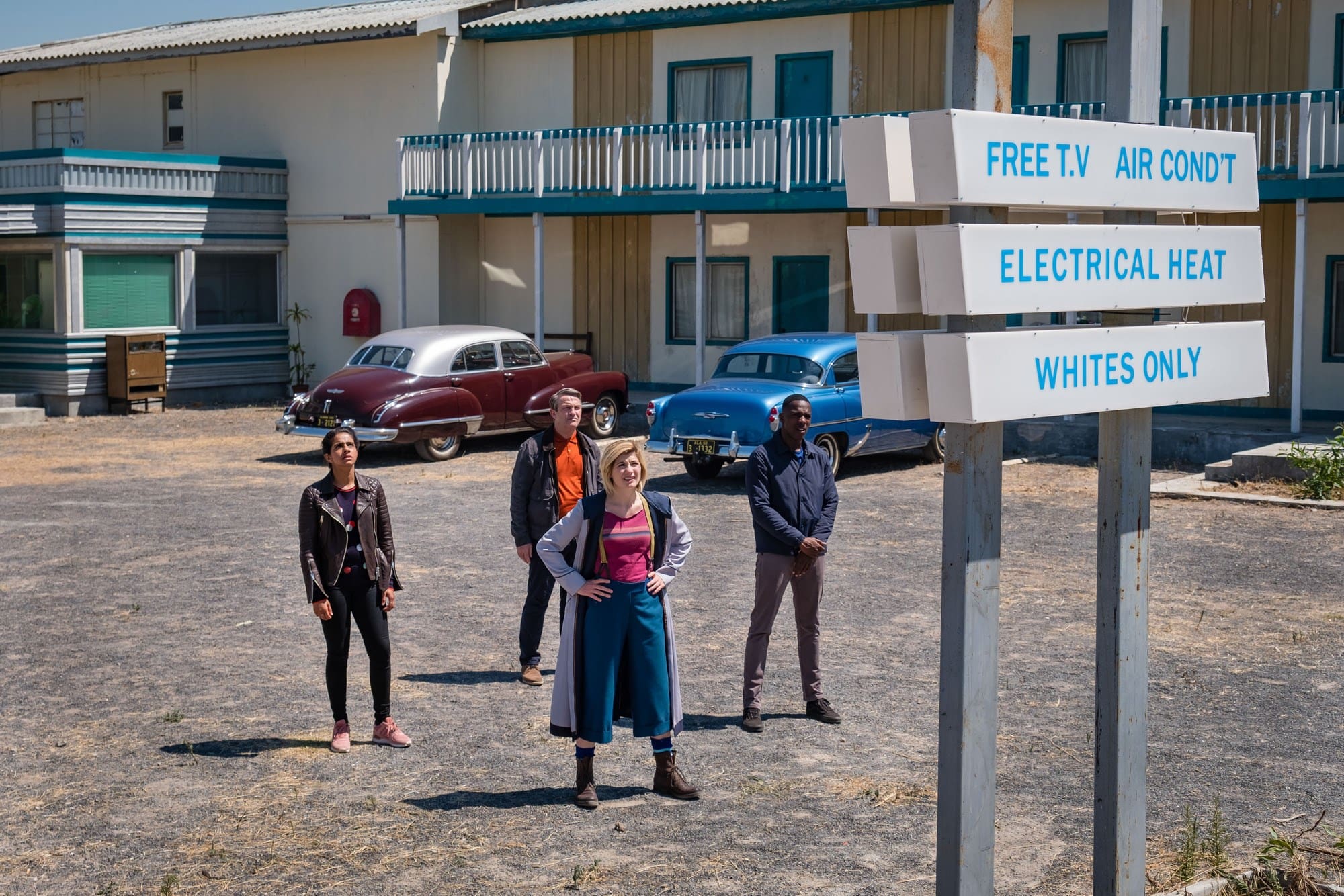
The hardest lesson the Doctor has to learn is letting history take its course. Over the many, many years of Doctor Who, we’ve been told that time can and can’t be re-written, that there are fixed points and frozen moments that can’t be changed but can be pushed. And the Doctor is there to protect them. But very rarely does the Doctor have to confront that history by just being a passenger to it. “Rosa,” is one of those times.
The Doctor (Jodie Whittaker) and the TARDIS crew find themselves in Montgomery, Alabama, in 1955. In short order, they are met with the harsh realities of the segregated American south as Ryan (Tosin Cole) is slapped across the face for tapping a white woman on the shoulder to return her dropped glove.
They are saved from the situation by Rosa Parks (Vinette Robinson) who deescalates the situation and promptly reminds our erstwhile time travelers of where they are. As a mysterious time traveling bigot, Krasko (Josh Bowman), sets about meddling with small parts of the known history to prevent Rosa’s protest that foments the bus boycotts.
To say going into this episode that I was nervous about how the story of Rosa would be handled would be an understatement. Fictionalizing an important moment in the American Civil Rights Movement – and, as the episode reminds us, for the world – brings a number of problems. To be fair, many people are taught or understand the story of Rosa Parks incorrectly, something that Yaz (Mandip Gill) mentions as the team plot out Rosa’s day.
Malorie Blackman’s script – the first woman of color to write for the television series – rather deftly handles the story and its interplay with standard Doctor Who attributes, though at times some of the “fixes” The Doctor and company implement can feel a little trivial in light of the importance of Parks’ protest. Still, the episode centers Rosa’s protest as squarely belonging to her, ensuring it’s not robbed of any power.
This episode most closely resembles a Quantum Leap episode, both in setup and in structure. Lush, historically accurate sets – here South Africa doubling for mid-20th century Alabama – and a time traveler making small, incremental or circumstantial changes to “preserve” history. Whittaker’s Doctor takes on a more serious tone in the episode, exercising caution about not changing history and reminding her companions of the importance of where and when they are.
When she tells Ryan to be careful as he travels through the town, it feels more serious than any Dalek encounter. Her sadness and resignation as she watches Rosa, unable to help unless she change history, speak so much. Still, the episode allows her comedic aspects to shine – her cavalier handling of Krasko and the Banksy jokes didn’t feel out of place.
Vinette Robinson’s portrayal of Rosa Parks is nuanced and wonderful. She feels like a woman plucked from time. She embodies the frustration and defiance of a civil rights leader, while still feeling like a human being.
Perhaps more resonant than the plot itself are that Ryan and Yaz’s encounters with racism in “the past” were fresh and brave steps for the series to take. The show has struggled in the past to effectively handled the question of how unfriendly much of the past is to people of color. Tennant’s Doctor encouraged Martha to just act with confidence and no one would mess with her, and Capaldi slugged a racist count for Bill.
The conversation between Ryan and Yaz, as they hide behind a dumpster from a police officer searching their “whites-only” hotel room, is the frankest the series has ever been on the subject of race. It should be a conversation that could only happen in the context of the past, but it feels so relevant today.
Graham (Bradley Walsh) has perhaps been the breakout star of the companions in the past three episodes, and I think this episode really gave him some things to hang onto as an actor. His determination to protect his grandson, Ryan, and the discomfort he feels over the entire situation of the South are well played and feel like real, honest emotions.
His interplay with the Doctor also feels the most interesting out of the three companions so far. Graham’s realization of having to be complicit in not helping Rosa, of having to stand by and let an injustice happen is so real and heartbreaking. It mirrors the pain on the Doctor’s face over the same thing. They know they have to, that it’s important, but it still hurts.
Yaz finally received some much needed attention, but felt a little sidelined to “Rosa Parks wikipedia” for much of the story. Hopefully she’ll get more time to shine, as her two emotionally-charged scenes featured a lot of depth for the character that can be tapped into. Ryan seems poised for a story arc about his willingness to use weaponry he doesn’t understand; I wouldn’t be surprised if it plays into some sort of comeuppance down the line.
At times the villain can feel very one-note, essentially just a “space racist” who is hoping to make his future less diverse by messing with history. There is a slight issue with all the companions using Rosa’s full name nearly constantly that can feel a little a sloppy. The use of Andra Day’s “Rise Up” at the end of the episode feels both appropriate and cloyingly over the top at the same time.
These minor hiccups aside, the episode is easily a standout from the past few years of Who episodes, and stands as something special, visceral and real. This one will be remembered alongside “Vincent and the Doctor” as a historical episode that tackles a very real and poignant issue in a serious manner, using the show to talk about relevant ideas through the lens of history and historical figures.
Rating: 10 out of 10
-Brian McNamara


Real good review, Brian!